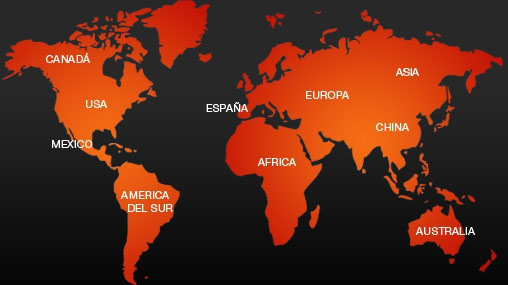- Inicio Acerca de RM Minerales
- Galería de fotos Blog RM Contacto
- Microscopia e instrumentos Pedidos Aviso legal
Copyright 2010-2025
www.rosellminerals.com



Nutrido grupo de cristales de tetraedrita de intenso brillo, con caras y aristas muy definidas. Las caras muestran complejos crecimientos y algunos vértices estan truncados por caras de tetraedro opuesto. Se acompañan de grupos de cristales de esfalerita, complejos, que se distinguen fácilmente por su color más grisáceo y brillo mate. Destacar la intensa fluorescencia anaranjada de esta esfalerita debida probablemente a la presencia de cadmio en su retículo cristalino. De una localidad distinta a la habitual y poco representada en colecciones.
Grupo de cristales de yeso selenita, uno de ellos de muy buen tamaño, que muestran una excelente transparencia y unas caras y aristas muy definidas. Ejemplar muy aéreo que ha crecido sobre una matriz de alabastro recubierta por pequeños cristales de yeso. En este ejemplar observamos la presencia de una marcada macla, lo que incrementa su interés. Una pieza de vitrina.
Bajo la luz ultravioleta de onda larga y corta muestra una intensa fluorescencia y una prolongada fosforescencia cuando dejan éstas de actuar. Los ejemplares de yeso selenita de las canteras de la zona de Fuentes de Ebro se consideran entre los mejores a nivel mundial.
Grupo de cristales de yeso selenita, uno de ellos de buen tamaño y casi biterminado, que muestra una excelente transparencia y unas caras y aristas muy definidas. Ejemplar muy aéreo que ha crecido sobre una matriz de alabastro recubierta por pequeños cristales de yeso. En este ejemplar observamos la presencia de fantasmas dentro del cristal principal, junto con una marcada macla, lo que incrementa su interés.
Bajo la luz ultravioleta de onda larga y corta muestra una intensa fluorescencia y una prolongada fosforescencia cuando dejan éstas de actuar. Los ejemplares de yeso selenita de las canteras de la zona de Fuentes de Ebro se consideran entre los mejores a nivel mundial.
Grupo de cristales de yeso selenita, uno de ellos de buen tamaño, que muestra una excelente transparencia y unas caras y aristas muy definidas. Ejemplar muy aéreo que ha crecido sobre una matriz de alabastro recubierta por pequeños cristales de yeso. En este ejemplar observamos la presencia de un varios fantasmas dentro del cristal principal, junto con una marcada macla, lo que incrementa su interés.
Bajo la luz ultravioleta de onda larga y corta muestra una intensa fluorescencia y una prolongada fosforescencia cuando dejan éstas de actuar. Los ejemplares de yeso selenita de las canteras de la zona de Fuentes de Ebro se consideran entre los mejores a nivel mundial.
Excepcional ejemplar de berilo, variedad aguamarina, que se dispone de forma muy aérea sobre una matriz rica en cristales de cuarzo ahumado. El berilo muestra muy buena transparencia y color azulado. Se acompaña de otro berilo biterminado encajado entre el cuarzo ahumado. Junto con cristales de chorlo y de feldespato. El cristal tiene una pequeña mella, aún así es una pieza muy estética.
Grupo de cristales de galena, muy brillantes, con buen tamaño, interpenetrados entre ellos y que muestran las caras del cubo y el octaedro. Se hallan parcialmente recubiertos por brillantes cristales de esfalerita de tonos melados, con transparencia, a negros y opacos. Se disponen sobre una matriz con pirrotita. Una pieza excepcional para este clásico yacimiento murciano.
Ejemplar de cobre pseudomorfizado por minerales secundarios de cobre como la malaquita y la azurita. En este ejemplar podemos encontrar una capa de pequeños pero brillantes cristales de azurita, así como cristales de mayor tamaño muy definidos y aislados. Se acompaña de pequeños cristales de cuarzo. Una pieza para disfrutarla con la lupa.
Excelente ejemplar de fluorita de intenso color y caras y aristas muy definidas. Muestra las formas cúbicas con crecimientos policristalinos y un color entre violeta a púrpura muy intenso y con zonación. Se acompaña de cristales de cuarzo.
La cobaltkoritnigita es la primera cita de este mineral en España. Se encuentra formando agregados globulares de intenso color rosado rojizo junto con la eritrita, de un color rosado. A nivel microscópico se observa que estos glóbulos están formados por cristales de aspecto tabular. Es un arseniato de cobalto con zinc y pertenece al grupo de la koritnigita (arseniato de zinc). En la mina se ha encontrado en los niveles bajos de la misma. Se enviaran los resultados del análisis al comprador.
De esta mina hemos publicado un libro "Rocabruna i el seu entorn. La mina de les Ferreres" donde se recogen todas las especies determinadas hasta el momento de su edición (2014).
Estas pepitas redondeadas de bismuto nativo se encuentran en el lecho del río Viloque. Proceden de la erosión glacial de filones del metal y se encuentran hoy día en placeres auríferos de este río. Esta pieza es un clásico ejemplo de estas pepitas, de intenso brillo metálico plateado, redondeadas por la abrasión, y con un buen tamaño para este yacimiento. El bismuto nativo se conoce en muchos lugares del mundo pero las pepitas del río Viloque son las más conocidas para la especie.
Excelente y muy rico ejemplar de theisita en el observamos numerosos grupos globulares formados por cristales lamelares de theisita de intenso color azul verdoso que forman agregados y que destacan sobre la azurita. Esta especie mineral es la segunda cita en España. Se enviaran los resultados del análisis al comprador.
Se trata de un poco habitual arseniato-antimoniato de cobre y zinc que ha sido descrito en esta mina del Pirineo.
De esta mina hemos publicado un libro "Rocabruna i el seu entorn. La mina de les Ferreres" donde se recogen todas las especies determinadas hasta el momento de su edición (2014).
Agregados radiales de cristales aciculares de tirolita que han crecido en las fisuras de una bolsada de barita. De color verde azulado característico y buen brillo. Se acompaña de agregados botrioidales de malaquita y sprays de aragonito acicular. Se enviaran los resultados del análisis al comprador.
De esta mina hemos publicado un libro "Rocabruna i el seu entorn. La mina de les Ferreres" donde se recogen todas las especies determinadas hasta el momento de su edición (2014).
Agregados radiales de cristales aciculares de tirolita que han crecido en las fisuras de una bolsada de barita. De color verde azulado característico y buen brillo. Se enviaran los resultados del análisis al comprador.
De esta mina hemos publicado un libro "Rocabruna i el seu entorn. La mina de les Ferreres" donde se recogen todas las especies determinadas hasta el momento de su edición (2014).
Excelentes grupos de cristales lamelares de claraíta de intenso color azul turquesa que forman agregados cristalinos sobre una matriz de dolomía con sulfuros. Los podemos disfrutar en ambos lados de la muestra. Se acompaña de glóbulos de theisita, de intenso color azul verdoso, junto con azurita. Se enviaran los resultados del análisis al comprador.
La claraíta es un raro carbonato de cobre y zinc que puede contener azufre y/o arsénico. La theisita es un poco habitual arseniato-antimoniato de cobre y zinc que ha sido descrito en esta mina del Pirineo. Estas especies minerales son la segunda cita en España.
De esta mina hemos publicado un libro "Rocabruna i el seu entorn. La mina de les Ferreres" donde se recogen todas las especies determinadas hasta el momento de su edición (2014).
Grupos globulares formados por cristales lamelares de theisita de intenso color azul verdoso que forman agregados sobre una matriz de dolomía. Una pieza excelente. Esta especie mineral es la segunda cita en España. Se enviaran los resultados del análisis al comprador.
Se trata de un poco habitual arseniato-antimoniato de cobre y zinc que ha sido descrito en esta mina del Pirineo. Se acompaña de numerosos cristales de azurita, transparentes, brillantes, bien definidos y algunos biterminados. También con malaquita en agregados botrioidales a estalactíticos.
De esta mina hemos publicado un libro "Rocabruna i el seu entorn. La mina de les Ferreres" donde se recogen todas las especies determinadas hasta el momento de su edición (2014).
Pequeño pero interesante ejemplar que nos presenta grupos de cristales prismáticos aciculares de curita de intenso color naranja. Observados bajo la lupa podemos ver que presentan transparencia y se acompañan de cristales amarillos de soddyita. Este mineral radioactivo lleva el nombre de Pierre Curie (ver wikipedia) y procede de Shinkolobwe, la localidad tipo para la especie. Una oportunidad para conseguir una pieza de curita cristalizada.
Drusa de cristales de cuproadamita que tapizan totalmente la cavidad en la limonita. Muestran crecimientos estalactíticos y un color verde azulado muy intenso. Se hallan salpicados de pequeños agregados globulares de smitsonita de color blanco, junto con esferas de rosasita de color verde. Se acompañan en la matriz de agregados globulares de conicalcita junto con cristales muy definidos de cuproadamita. Un interesante ejemplar de buen tamaño.
Grupo de cristales cúbicos de fluorita de tonos violetas que presentan cierta zonación de color, algo de transparencia en algunos cristales, siendo translúcidos la mayoría. Característica son las estructuras de corrosión en las caras. Se disponen formando grupos interpenetrados sobre una matriz con óxidos de hierro. Lo que quiero destacar también de esta pieza es la mina de donde proceden, cercana a Alumbres.
Grupo de cristales piritoédricos interpenetrados en matriz procedente de una localidad clásica como es Ambasaguas. Caras y aristas definidas, color dorado muy intenso y brillo excelente. La perfección de las piritas riojanas.
Interesante y antiguo ejemplar de annabergita de intenso color verde que presenta cristales prismáticos aplanados con transparencia. Se dispone en unas cavidades de la matriz dolomítica. El espécimen, que procede de un yacimiento clásico europeo como es Laurion, se acompaña de una etiqueta antigua del s. XIX procedente de una colección alemana desconocida (por ahora).
Grupo de cristales de fluorita que muestran formas cúbicas que destacan por su delicado color verde manzana. Buena transparencia y buen brillo. Se hallan parcialmente recubiertos por brillantes grupos de cristales de quarzo hialino. Una pieza muy luminosa procedente de Marruecos.
Novedad de la feria de Castelló 2014. Se trata de un grupo de cristales de aragonito que presentan formaciones coraloides de intenso color blanco con ligeros tonos marronáceos en sus extremos. Procede de una zona almeriense bien conocida por sus aguas termales.
Novedad de la feria de Castelló 2014. Se trata de un grupo de cristales de aragonito que presentan formaciones coraloides de intenso color blanco con ligeros tonos marronáceos en sus extremos. Procede de una zona almeriense bien conocida por sus aguas termales.
Excelente combo formado por un grupo de cristales de ferberita con crecimientos paralelos, de intenso color negro y buen brillo, salpicados por cristales lenticulares de siderita. Sirve de soporte a éstos un cristal de cuarzo hialino parcialmente recubierto de moscovita. Hay que decir que el cuarzo tiene una pequeña mella en una de las caras de los romboedros, sin afectar a la estética del conjunto. La arsenopirita se halla sobre la ferberita, en uno de sus extremos. Una pieza con incomparable estética, de una localidad clásica como es Panasqueira.
Ejemplar muy rico en cristales lanceolados de clinozoisita de tono verdoso, brillantes y definidos. Se acompaña de grupos de cristales de cuarzo con el prisma muy desarrollado segun el eje principal. De una localidad peruana poco representada en colecciones.
